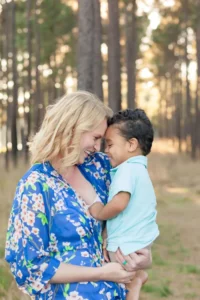In a touching story from The Woodlands, Texas, Chelsea Zeleny-Floro and her husband showed the strength of love and compassion by going against the grain and growing their family. The couple adopted a newborn girl in 2016 and already had a son and daughter with autism. They had no idea that a Facebook request would inspire them to embark on an incredible adventure.

The social media post detailed a hospitalized youngster who was considered medically fragile and in dire need of placement because they lacked femur bones. Zeleny-Floro was hesitant at first, but she was unable to ignore the cry for assistance. The couple made the decision to adopt the child after a protracted discussion with a nurse who specializes in adopting children with special needs.
Brought into a family already facing the challenges of autism, the baby, named Charles, presented unique hurdles. With no femur bones, no hips, and double amniotic bands around both feet, he posed a significant challenge for the Floro family. Zeleny-Floro, initially terrified, questioned her ability to handle the situation.

The months that followed were an emotional rollercoaster, filled with regular sickness, a lot of doctor’s appointments, and unceasing tears. Prognoses from doctors varied, from the prospect of playing high school football to the likelihood of using a wheelchair. In the midst of the chaos, the family’s developing affection for Charles was evident.
Due of difficulties with their foster placement, an adoption proposal was made. On November 15, 2017, the family’s unwavering “yes” signaled Charles’ official arrival into their life. Subsequent milestones exceeded original estimates.

Named after Zeleny-Floro’s husband’s late granddad, Charles began to crawl differently, showing determination to emulate other children. On his second birthday, Charles stunned the family by standing up and taking six steps without using his walker—an achievement deemed improbable.
The Floro family’s encounter with Charles disproved their assumptions and made them realize how unrealistic their expectations were. Zeleny-Floro highlights the important lesson that was learned, which is to encourage parents to talk to their children about diversity and to avoid categorizing someone just by their disability. She promotes accepting each person’s individuality and eradicating preconceptions based on conduct or looks.

The Floro family hopes that by redefining what it means to be “disabled,” their narrative may encourage other parents to help their kids develop empathy and acceptance. Zeleny-Floro’s message is simple: “Talk about how we are all made special, and that just because somebody doesn’t look or act like you, doesn’t mean they should be treated any differently.” The tale of Charles serves as a testament to the transformative impact of love, acceptance, and the celebration of individuality.





